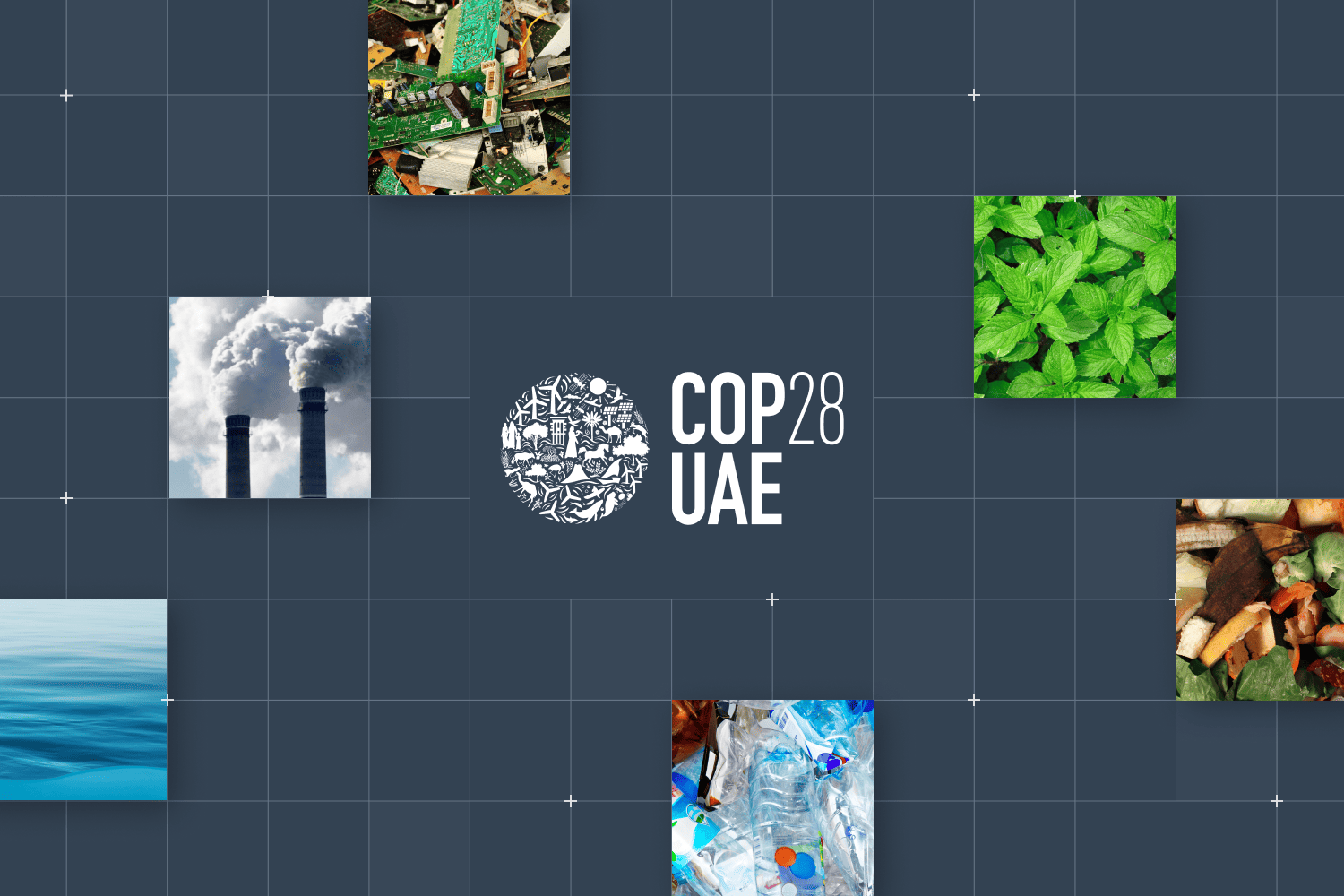As scientists continue to warn of unprecedentedly high temperatures and widespread impacts of extreme weather events, the United Nations Climate Change Conference (COP28) stands as a crucial moment for global leaders to refocus efforts in addressing the climate crisis. COP28 brings together leaders from governments, businesses, and NGOs to assess advancements made under the Paris Agreement.

The solution laid out in the treaty is simple: to limit global warming to 1.5°C by rapidly weaning off the production and usage of coal, and establishing global renewable power resources (i.e., wind, solar, hydro and geothermal energy) threefold by 2030. As a time-pertinent and major humanitarian issue, financing for adaptation and investments in climate resilience needs a quantum leap.
What has emerged from the negotiations in Dubai is a number of themes that will define nearly every sector, with discussions around whether to “phase out” or “phase down” fossil fuels, the environmental impact of food systems, and how geopolitical conflict will affect decision-making taking center stage. However, reporters covering the event have noticed that, while COP meetings are intended to instill clean energy resources and cut back on harmful forms of fuel, COP28 seems to have served as meeting grounds for the exact opposite.
It appears some altruistic power players are using this year’s conference to share ingenuine intentions or propose half-baked climate change initiatives to ward off criticism. Further, political leaders, government officials, and lobbyists are even taking COP28 as an opportunity to solidify energy-polluting deals. It’s leaving many to question: what’s happening behind the curtains of CO28?
We dive into answering this question with the use of the AlphaSense platform.
The Fate of Fossil Fuels
Uproar erupted amongst delegates when it came to defining the language regarding “phasing out” or “phasing down” the use of fossil fuels. It led to two different drafts for the “global stocktake,” a document assessing the world’s progress in emission reduction issued post-summit, to surface. While one faction of countries advocates for “an orderly and just phase out of fossil fuels,” another contends for “rapidly [reducing] their use” without a complete phase out.
This dispute has led some authorities to take a public stance, with the European Union committing to support a phase-out. “All 27 European member states want this to be part of the negotiated outcome,” climate commissioner Wopke Hoekstra told a news conference.
Although COP conferences have traditionally been synonymous with global discussions on climate change, debates on the future of fossil fuels only became prominent two years ago. Further, a pledge may not signify an immediate cessation of fossil fuel usage, but more so an acknowledgment of the need to address the primary source of climate change.
However, the contentious “phase out” debate at this year’s COP has been one marked by controversy due to not only the unprecedented number of oil lobbyists in attendance, but also the presidency of Sultan al-Jaber, an Emirati oil executive. The United Arab Emirates has already indicated reluctance to endorse a deal to end fossil fuel usage, and recent reporting by the BBC suggested that the petrostate aims to use the conference to secure new oil deals, a claim denied by the UAE.
“This year’s call for phasing out fossil fuels surrounding COP28 and massive deployment of renewable energy is posed as one of the most significant asks and priorities. Finding the levers and pathways for rapid decarbonization is critical and bringing people on this journey is key to that unlock.”
“Across sectors, there remains a significant gap between consumers’ values around environmental and social issues and the way they behave – known as the ‘value action gap’. In the oil and gas industry, however, this is a colossal 66% gap, the highest gap of all the 42 sectors measured in the Sustainability Sector Index. This shows that people feel that the industry is failing to step up—and capitalise on—the green opportunity. So, it’s particularly important for brands in the industry to mind the gap, innovate and facilitate people’s transition toward more sustainable behaviours in line with their needs and beliefs.”
– Kantar | Report 2023
Ultimately, critics argue that COP has become a greenwashed event, considering the record number of oil lobbyists in attendance this year. Some campaigners believe that industry profits are taking precedence over addressing human-caused climate change.
Food for Thought
COP28 marks the first time delegates focused discussions over the toll of food systems, leading over 130 countries to endorse a resolution that recognizes the significant climate contribution of meat production to greenhouse gas emissions.
The resolution additionally urged affluent nations to promote reduced meat consumption among their citizens. Although described as a “long overdue” conversation by some experts, there remains skepticism about the practical implementation of these recommendations, particularly in developed countries such as the U.S.
Critics argue that the proposals oversimplify the intricacies of food systems, neglecting factors like power imbalances, industrial food production, and the disproportionate impact of climate change on the Global South.
Within the AlphaSense platform, a Globe Newswire press release detailed the initiatives formed at COP28 to establish food resiliency within the Southern regions of the globe:
- “Several new initiatives to transform food systems were announced at the UAE Pavilion at COP28 during day 5 of the global climate conference. Further, in line with the COP28 focus on Gender Day on 4 December, programs at the UAE Pavilion also emphasized the critical role of women in fostering climate smart agriculture worldwide.”
- “The UAE-based International Center for Biosaline Agriculture (ICBA) announced the formation of the Women Alliance for Climate Action in Agriculture (WACAA). Dr. Tarifa Al Zaabi, Director General of ICBA, and Her Excellency Razan Al Mubarak, the UN Climate Change High-Level Champion for COP28, highlighted the disproportionate impact of climate change on women, particularly in agricultural communities, and stressed the need for inclusive policies in fostering climate-smart agriculture. The just-launched WACAA will unite women leaders, scientists, policymakers, farmers, researchers, and organizations to mitigate the impact of climate on agriculture and strengthen the resiliency of food systems, aiming to reach one million women worldwide by 2050.”
- “Her Excellency Mariam Al Mheiri, the UAE Minister of Climate Change and Environment (MOCCAE), announced the new UAE Food Innovation Hub to transform food systems and increase access to sustainable, nutritious and affordable resources. The project is a collaboration between MOCCAE, the Mohammed bin Rashid Al Maktoum Global Initiatives (MBRGI), and the World Economy Forum (WEF) – and the UAE will be the sixth hub launched by WEF to bring together stakeholders under the farm-to-fork concept as part of the sustainable food supply chain.”
- “The Anwar Gargash Diplomatic Academy (AGDA), in collaboration with the UAE Ministry of Foreign Affairs, hosted a timely discussion on Addressing the Triple Nexus: Gender, Climate & Security in the Regional World, exploring the interplay between climate and gender inequality in conflict prevention, resolution, and peacebuilding and the need for gender inclusion in National Adaptation Plans (NAP).”
- “And, the Global Islamic Finance Program (GIFP) for Climate, Nature & Development and their advisory committee were featured in an engaging program at the UAE Pavilion at COP28. The GFIP is a joint collaboration between Emirates Nature – WWF, Ajman University and other stakeholders to catalyze blended finance to achieve bankable nature-based solutions across the Global South.”
However, the reduction of meat demand contradicts the economic growth plans of many nations, and some hold ideological objections to government intervention in shaping consumer behavior. In the US, an AP poll revealed widespread opposition to a potential meat tax to combat climate change.
While COP28 aims to address food system issues, skeptics among sustainable food advocates question the summit’s commitment to tackling root causes. A representative from Slow Food expressed reservations, noting the absence of concrete measures or targets in proposed agendas for effectively transformative changes in food systems.
Further, some delegates believed that the summit’s discussion may oversimplify the complexities inherent in food systems, neglecting issues like power imbalances, industrial food production, and the disproportionate impact of climate change on the Global South.
Despite these concerns, countries in the Global South perceive COP28 as a “beacon of hope” in addressing their specific challenges, including climate finance, technology, and fossil fuel dependence.
Russia’s Role in COP29
While COP28 has just wrapped up, delegates are already looking ahead to COP29.
With the U.N. frantically scouting for a host for COP29 after this year’s controversial summit, Azerbaijan emerges as a probable frontrunner. This likelihood is bolstered by Armenia, a historical rival of Azerbaijan, unexpectedly withdrawing its bid and expressing support for Baku to host the upcoming summit.
The prospective host of next year’s gathering encounters significant challenges, as geopolitical considerations impede climate action. While the rights to host the summit rotates globally, the notion of an Eastern European country hosting the upcoming summit is complicated by the ongoing invasion of Ukraine by Russia.
“Under U.N. rules, the summit moves between five global regions, whose countries must agree on a host. But Moscow has signaled its intention to block EU countries from the role because of the bloc’s opposition to its war in Ukraine, with Bulgaria becoming the latest country to drop its bid following intervention from Russia,” Semafor reports.
In the competition brewing to host, the selected country gains significant influence over global climate legislation, making it an appealing role for smaller nations. Nevertheless, Russia’s stance is prompting governments to explore alternative solutions, with Bulgaria’s environmental minister suggesting the possibility of dividing the extensive summit into a series of smaller conferences held in various Eastern European countries.
Politico’s Corbin Hiar questions whether selecting Baku for COP29 would constitute “another win for oil states.” Azerbaijan, following in the footsteps of previous hosts Egypt and the United Arab Emirates, is a major oil exporter engaging in discussions on addressing our warming planet.
The ongoing debate over the host of COP, heavily influenced by Russia’s agenda, could also signal future challenges related to energy. Russian President Vladimir Putin’s visit to Abu Dhabi during COP28, where he negotiated oil deals, was seen as a deliberate gesture undermining the global climate talks taking place nearby. Ultimately, the contenders for COP29 all have strong ties to Russia’s energy industry, with Baku strengthening its connection to Moscow, and the other top two contenders, Serbia and Moldova, relying on Moscow for oil and gas supplies.
COP30, set to be hosted by Brazil, could provide an opportunity for the Amazonian people to have their voice heard. The decision to host COP28 in Dubai raised concerns for Indigenous communities, as fossil fuel lobbyists significantly outnumbered Indigenous community representatives.
COP30 provides an opportunity for governments to engage in discussions about how the development of emerging green technologies can be enriched by drawing on the ancestral knowledge of indigenous peoples, according Mariana Ribeiro of Purpose. While the Earth’s rainforests present economic opportunities, leaders at COP30 must advocate for Indigenous representatives on the debate floor to understand the practical urban challenges faced by the 30 million inhabitants of the Amazon.
Staying on Top of the Energy Crisis and Climate Change
An increasing number of C-Suite executives are implementing market intelligence and search platforms into their operations to find the answers they need and act swiftly on matters regarding eco-friendly resources and initiatives. But not every market intelligence platform provides measurable ROI, which is why it’s important to select one that fits your needs in navigating the energy transition.
AlphaSense’s AI search technology and extensive content library, which aggregates business documents from over 10,0000 content sources, allow our clients to remain at the forefront of their respective industries.
Start your free trial with AlphaSense today to see how our platform can keep you at the forefront of the power sector.




